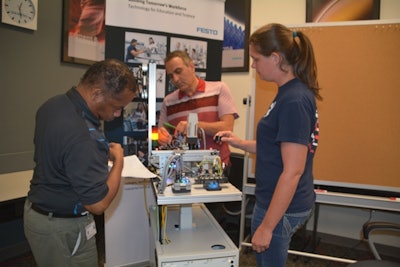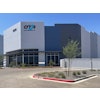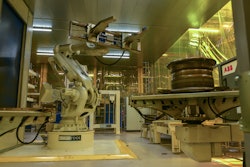Siemens has partnered with Festo Didactic to offer the new Siemens Mechatronic Systems Certification Program (SMSCP), which will help students, instructors and learning institutions combat the skills gap in the rapidly changing manufacturing industry. 
As automated systems become more complex, the need for qualified people with knowledge of integrated mechatronic systems is critical. Through the SMSCP program, Siemens and Festo Didactic are providing access to expert trainers, sophisticated learning systems, and industry-approved curriculum required for these skills.
“The partnership between Siemens and Festo Didactic enables us to explore new methods of learning by creating an experiential hands on learning environment combined with the theoretical aspects of didactic training,” says Gail Norris, U.S. Lead Industry Learning Services. “This new approach allows us to offer a holistic and robust experience to instructors, who will go on to train the workforce of the future.”
“Siemens and Festo Didactic are natural partners for elevating and expanding mechatronic and advanced manufacturing training,” says Thomas Lichtenberger, CEO of Festo Didactic. “We’re committed to designing new and exciting career pathways in the industry we’re passionate about – but that cannot be done without thoughtful and innovative considerations when it comes to how we teach our students.”
The first U.S.-based SMSCP program for educators was held on June 4-15, 2018 at the Siemens training center in Atlanta. Participating instructors had the opportunity to learn in a simulated smart factory environment, working on the latest technology with problem-solving scenarios they would encounter in real-world manufacturing environments.
Siemens SMSCP certification is internationally recognized and verifies that instructors and students have obtained a world-class technical background. The certification allows employers to identify and hire qualified candidates for the challenging and complex roles of the future.
Industry benefits of an SMSCP certification:
- Certified, well-trained, employees: Increase efficiency and productivity
- Reduce time to productivity of new employees: reduce on-the-job training
- Cost savings on training and education: highly skilled workers from local schools

















